Project Gutenberg's The Nursery, February 1881, Vol. XXIX, by Various
This eBook is for the use of anyone anywhere at no cost and with
almost no restrictions whatsoever. You may copy it, give it away or
re-use it under the terms of the Project Gutenberg License included
with this eBook or online at www.gutenberg.org
Title: The Nursery, February 1881, Vol. XXIX
A Monthly Magazine for Youngest Readers
Author: Various
Release Date: September 14, 2012 [EBook #40753]
Language: English
Character set encoding: ISO-8859-1
*** START OF THIS PROJECT GUTENBERG EBOOK THE NURSERY, FEBRUARY 1881 ***
Produced by Emmy, Juliet Sutherland and the Online
Distributed Proofreading Team at http://www.pgdp.net Music
transcribed by June Troyer.
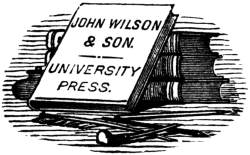
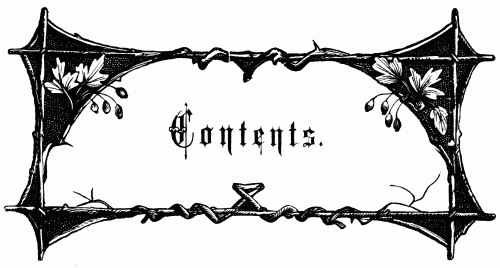
| PAGE | |
| Almost ready for Launching | 33 |
| Louis's new Plant | 36 |
| "One-old-cat" | 39 |
| What is the Horse doing? | 40 |
| Why wouldn't the Kite fly? | 45 |
| Drawing-Lesson | 49 |
| Bertie at his Uncle's | 50 |
| Rich and Poor | 56 |
| Red Coral Beads | 58 |
| PAGE | |
| The Would-be Travellers | 37 |
| A Queer Kitten | 42 |
| How Blue-Eyes watched for the New Year | 43 |
| The New-laid Egg | 47 |
| The Good Ship "Rosa Lee" | 54 |
| The Snow-Fairies | 57 |
| His Royal Highness | 62 |
| Nursery Song (with music) | 64 |
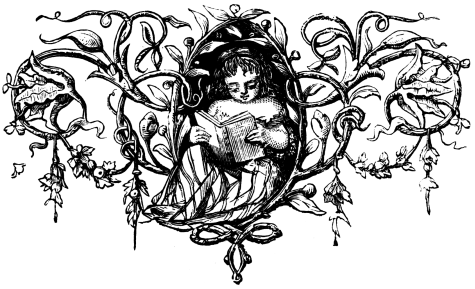
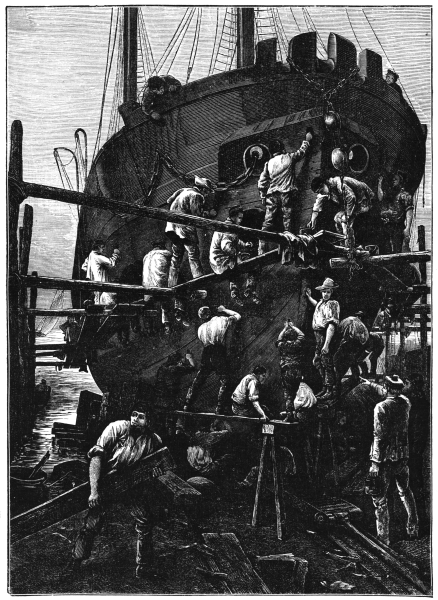 ALMOST READY FOR LAUNCHING.
ALMOST READY FOR LAUNCHING.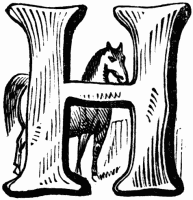
What are they doing? Well, most of them, I think, are calkers. Do you know what that means? I will tell you.
After the frame of a ship is set up, the timbers firmly bolted and braced, and the planking put on and fastened, inside and out, the next thing to be done is to make the seams water-tight.
For this purpose, slivers of oakum, rolled up in the hand, are driven into the seams between the planks. When the seams are filled, they are covered with melted pitch or rosin to preserve the oakum from decay. This process is called calking.
Most of the men seen in the picture are doing this work, but not all of them. Some are driving in the oakum with a tool called a calking-iron. Some are putting on the pitch. I will leave it for you to find out what the others are doing.
If we could look on deck and on the other side of the ship, we should see men at work there too. Hark! Don't you hear the sound of their hammers? All is bustle, but there is no confusion. Every man knows what to do, and does his work with a will.
After the calking is done, the painters will take their turn. They will put on two or three coats of paint; then the carvers and gilders will make a handsome figure-head; every thing will look as neat as a new pin; and then it will be time to be thinking of a name for the vessel, for, if I am not mistaken, the ship will be ready for launching. Let us[35] fancy that we are present at the launch. I think I see her now gliding into the deep water that awaits her.
She floats away from her cradle. She sits like a duck upon the water. She is staunch and strong and tight. So far the work has been well done. What comes next?
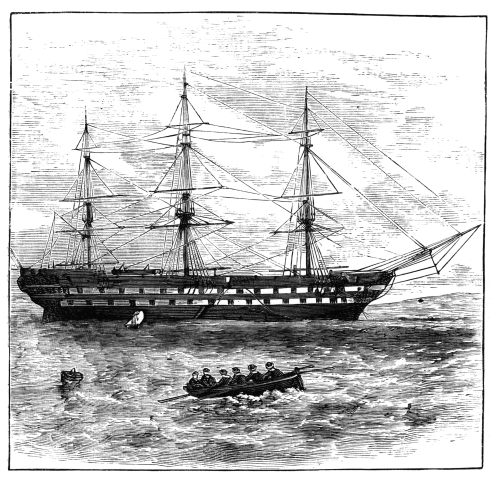
The riggers will now take her in hand. Masts and yards and shrouds and sails will soon be in their places. Soon we shall see her in the harbor all ready for sea; and by and by, with sails all set and streamers all afloat, she will move gracefully down the bay. May she always have fair winds and prosperous voyages!

So they planted three or four peanuts. Louis expected to raise peanuts enough for the whole neighborhood; and one lady to whom he mentioned it engaged a bushel on the spot.
In due time a little plant appeared, carrying one of the nuts on its head; but, finding that too much of a load, it left the parent nut on the surface of the ground, and sent bright green leaves up, and little threads of roots down, until, with its sisters, which had been growing in the same way, it made a group of three pretty plants.
All summer Louis took pride in showing them. Although they grew so finely, many persons prophesied that they would never bear nuts. But, in the latter part of September, Louis dug from one of his plants a nut which was perfect in form, though not yet divided into shell and meat. It was like a raw potato.
He waited patiently, and early in November he dug a saucer-full of well-ripened nuts. The plants had sent out a shoot from each joint, and these grew downward into the ground, and at the end of each shoot grew a nut. So Louis thinks it is correct to call it a ground-nut.
Louis took a sample of the nuts to "The Nursery" office, and it was pronounced to be of good quality. Although he could not supply the order for a bushel, he intends to try again next year, and hopes to raise a larger crop.
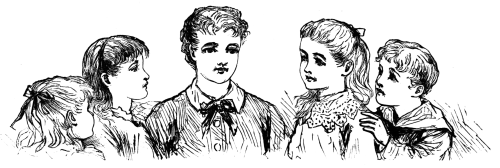
| ARTHUR. Oh, if I only had a pair Of Indian snow-shoes I could wear, The storms might beat, the winds might blow, Across the drifts I'd northward go, And see the Northland's splendid sights,— The red, and green, and yellow lights, That up the sky at night-time stream, The icebergs on the sea that gleam, And, peering from his hut of snow, In walrus-coat, the Esquimau; And with my loud hurrah I'd scare From out his den the grizzly bear. | 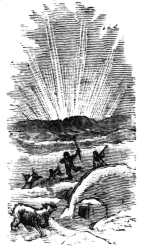
|
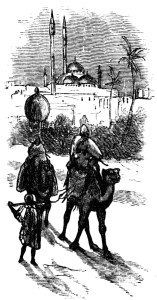
| BERTHA. And, if I only had a boat, I'd spread my sail, and eastward float, And see the far-off Eastern lands, The palm-trees, and the desert sands, The camels and the caravans; Tall shining towers, and curious towns, And men with turbans on, and gowns; And bring home, lovely to behold, A charming dress of cloth-of-gold. |

| DICK. And, if I only had a horse, I'd westward, westward take my course; With flying feet and floating mane He'd gallop with me o'er the plain; As lightly as the wind we'd pass Across the waving prairie-grass, And strange, tall blossoms, blue and red, Would nod about my horse's head. ELSIE. And, if I had some wings to fly, I'd southward soar along the sky, And see the Southland all aglow With roses, when with us there's snow; And flutter down to rest me, where The starry myrtle scents the air, And humming-birds dart out and in The blossoms of the jessamine; Where his green mate the parrot calls, And oranges, like golden balls, Hang on the boughs, I'd spend the hours In gathering figs, and plucking flowers. LITTLE SUSIE. Oh, if you want to, and you can, I'm willing you should roam; But I'm dear mother's little girl, I'll stay with her at home. MARIAN DOUGLAS. 
|
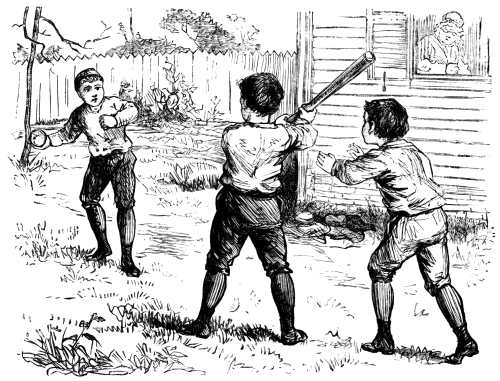

Presently up jumped one boy, and said, "Come on, fellows, let's play something."—"All right," said another boy, "One-old-cat." Then they all ran into the house.
"Dear me!" said grandma, "I thought they were good boys; but they seem to be going to tease pussy." In a few minutes the boys came back. One of them carried a large club, while another had something which grandma, who could not see very well, took to be a stone.
"Oh, what cruel boys!" thought the old lady. "It's bad enough to tie things to a cat's tail; but to beat her with a club and to throw stones at her is still worse."[40]
"I'll be pitcher," shouted one of the boys. "There!" said grandma, "he says he'll pitch her. Who would believe that boys in red stockings and blue suits could be so cruel?"
"I'll be inner," cried another boy.
"Inner!" said grandma. "What does that mean? Some new expression. I have no doubt, which I never before heard; but an old lady of eighty years can't be expected to keep up with the times. It's something dreadful, of course."
But what was the old lady's surprise when the boys threw aside their blue jackets, and two of them began to throw the "stone" back and forth, one to the other; while the third boy stood between, striking at it as it flew through the air, and sometimes hitting it and sometimes not. There they staid all the afternoon doing the same thing.
"Why," said grandma, putting on her glasses, and looking more closely. "I declare! they're only playing ball, after all. Well, I'm glad they're not so cruel as I thought them. They are such pretty little boys, and have such pretty red stockings too!"
"But," said she, after a long pause, "there is still one thing that troubles me. Where is the 'old cat'?"

Some boys had placed in a field a snare by which they hoped to catch a rabbit. It was a sort of noose made of coarse, twisted grass. Fido, the dog, put one of his forefeet[41] in the noose, and in trying to get away his leg was doubled up by it.
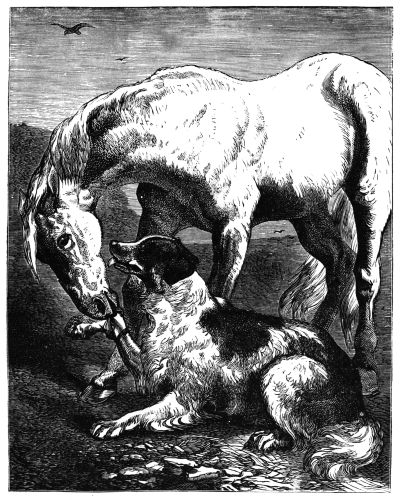
He limped off howling to his friend Hero, an old horse that was grazing near by. Fido lifted up his leg, and Hero at once saw what was the matter. But Hero had no knife with which to cut the noose. What could he do?
He did not stay long in doubt. He put down his head,[42] and began to gnaw at the noose. Taking good care not to bite Fido, he nibbled at the wisp of twisted grass till it dropped off, and the good dog was free.
You should have seen Fido as he scampered round, jumped up, and barked at his old friend. "Barked at him?" Yes; but it was all in play, as much as to say, "You dear old Hero! How I thank you! I will do as much for you, should you ever get into trouble. Bow, wow, wow!"
And Hero galloped round, and threw up his heels, but took good care not to hit his friend Fido. Each seemed to be glad in the feeling that a kind act had been done.
This is a true story, and Mr. Harrison Weir has told it well in his drawing.
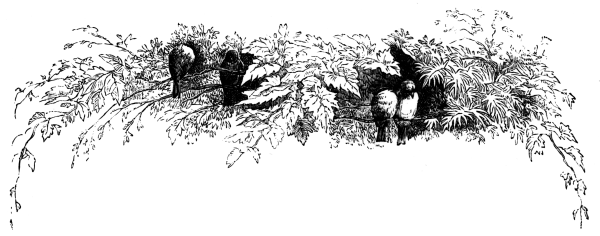
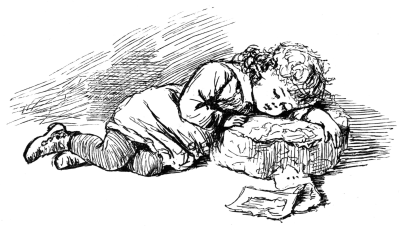
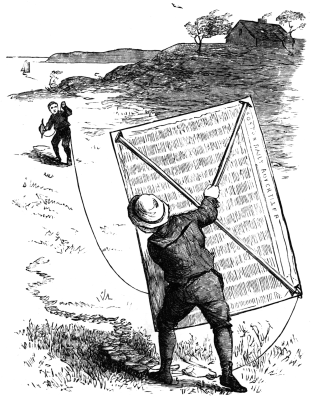

Just before dinner they had been in bathing. Since dinner they had been over in the fields, picking up long feathery grasses to put in mamma's vases. And now, what should they do next?
At last, Jack thought it would be fine fun to make a large kite, much larger than any they had ever seen. Fred[46] said he would help; and off they ran to get sticks, tacks, paper, paste, and string, so as to have every thing ready.
When they could think of nothing else that was needed, they set to work. Jack cut and tacked the sticks together, just as the smaller ones were in his little old kite; while Fred cut the papers, and made the tail.
Having joined the four ends of the sticks with string, they covered the whole with newspaper, pasted nicely, and left the kite in the sun to dry. Then Jack thought of one thing that had been forgotten: they had not tied on the string. So they had to cut a hole in their paper, and put the string through. Then, of course, the holes had to be patched up again, and this took a good while.
The wind was blowing quite briskly, and the boys thought they could not wait any longer, although the kite was not quite dry. Fred said he would pitch the kite, if Jack would let out the string. You can imagine how Fred looked, as he ran out before the wind, with this big kite that was much taller than himself. Jack said it seemed as though the kite had legs of its own, and was walking off.
Fred pitched the kite. It went up bravely. Jack ran with it, letting out the string, little by little, when, all of a sudden, there came a heavy gust of wind. The string broke, and the kite fluttered down, flat on the ground.
But these boys had been taught to always "try again." So they went to look for a stronger string.
Jack thought of the clothes-line. Off he went, and soon came back with a good long rope. This they tied on, and now they thought the kite would surely fly. Jack pitched it this time, and what do you think happened? The string was too heavy. The kite went up, but soon came down; and, what was worse, the paper was so thin, that the wind tore it all to pieces.[47]
"Never mind!" said Jack, "we'll try again to-morrow. You see, Fred, if we have a large kite, we must have a strong cover for it and a stout string."
Then the two boys went to work, and covered the kite-frame with cloth. They got a string that was very strong but not too heavy; and the next day they had a grand time flying their kite.
Some day I will tell you more about these boys who were always ready to "try again."
Who laid the egg? "Cut, cut-ca-dah!" said the hen: "When the clock struck ten, I laid an egg." | 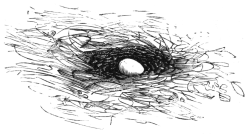
|
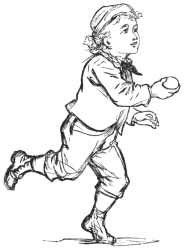
| Who'll take it to the house? "I," said little Dick: "I'm very quick, And I'll take it to the house." |
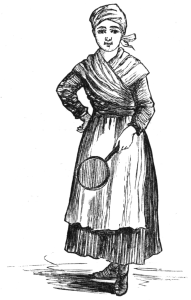
| Who knows how to cook it? "I," said good Mary Ann; "In my own frying-pan: I know how to cook it." |
Who'll eat it when it's done? "I," said little Phil, "Because I am ill: "I'll eat it when it's done." | 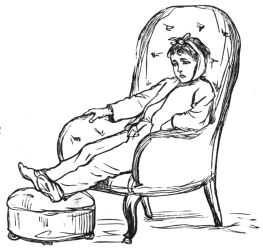
|
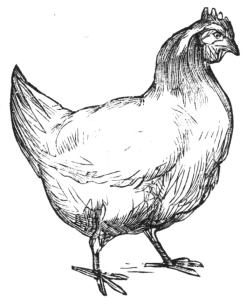
| Who'll lay another? "Cluck, cluck, cluck!" said the hen; "Feed me well and then I'll lay another." C. L. K. |
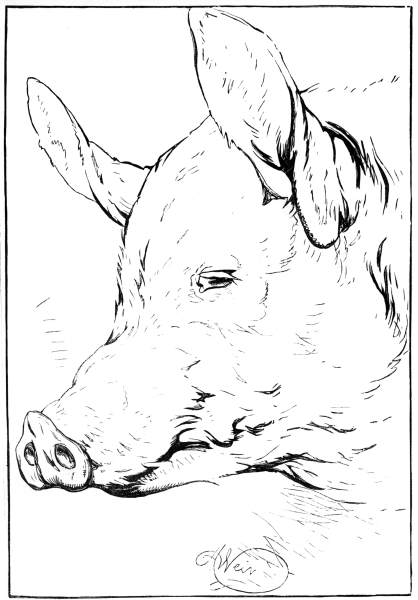 DRAWING-LESSON.
DRAWING-LESSON.
He has never until now been away from his papa and mamma for a day. But he thinks he shall not mind it, because uncle Frank is such a funny man. He can make you believe that there is a big bumble-bee on your hair, or flying and buzzing about the room. He can squeak just like a mouse, or mew like a cat, or chirp like a bird.
But uncle Frank cannot play with Bertie all day long. He has an office down town, where he must stay part of the time. So he tells Bertie to keep off the street, and be sure not to follow the circus, or the man with the organ and monkey.
Bertie says he will stay in the house, and visit with Poll the parrot, and Dick, the canary. "If you need any thing more to make you happy, ask Dora the housekeeper for it. She will look after your wants till I return," uncle Frank says as he takes leave of Bertie at the door.
"Good-by, uncle Frank!" says Bertie.
"Don't follow the circus! don't follow the circus!" cries Poll from her perch.
Bertie laughs, and answers back, "Don't scold! don't scold!"
This puts Poll in the very best of humor. She turns up her eyes, tries to look smart, and screams back at the top of her voice, "Thieves, thieves! Call the police; call the police!"
Then Dora comes in, and finds uncle Frank gone. She tells Bertie she has something to show him. He follows her[51] out through the kitchen, and up a long pair of stairs, to an attic. There is a large box in the attic. Dora calls it a chest. It is painted blue, and has a lid to it. The lid is made of woven wire.
Dora goes on tiptoe and looks over into the box. Then she softly raises the lid, and lifts Bertie up so that he can see into it. "Oh, what funny cats!" cries little Bertie.
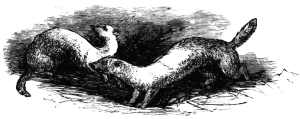
"Indeed they are not cats," Dora says, smiling.
"Then they must be little puppies. But what red eyes they have! and such straight bodies! How funny they do look!" Bertie says.
"No, my little man, they are not puppies. You will have to guess once more," says the good-natured housekeeper.
"Are they rabbits?" asks Bertie.
"No, not rabbits, either," is the reply. "Guess again."
"Oh, please tell me what they are!" pleads Bertie. "I am sure that I can never, never guess all alone."
Dora laughs, and says they will go down and get Poll the parrot to help him guess. Poll is still on her perch; and Dora, holding a cream-cracker, says, "Here is a nice cracker, Poll. Now tell Bertie what is in the big chest in the attic."
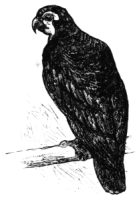
"Polly wants a cracker!" cries the bird.
"What is in the attic?" asks Dora.
"Ferrets, ferrets! Run, rats! Run for your lives!" screams the parrot. "Polly wants a cracker!"
"There, my little man; now do you know what is in the chest?" asks Dora as she gives the cracker to Poll.
"Polly says they are ferrets," replies Bertie, dropping his eyes; "but I do not know what that means."
So Dora asks Bertie to sit beside her, and she will tell him about the little ferrets.
Just as she finishes a nice long story about an old ferret and a great long-tailed rat, a little girl's voice under the table calls out, "Come here, Bertie: I want to tell you something." Bertie slides down from the sofa, and runs to the table. He lifts up a corner of the table-cover and looks under.
There is nothing to be seen there, except a pair of very crooked legs, which belong to the table, of course.
"What does all that mean, I wonder!" Bertie says. And his eyes are as round as moons.
But, before Dora can reply, the same voice says, "Go to the door, Bertie: there is something there for you."
Bertie walks slowly toward the door, but stops halfway there, and asks, "Is it April-fool's Day?" And the voice under the table answers, "Go to the door and see."
So Bertie tries to look bold, and marches up, like a soldier going to battle. "Left, left! right, right!" calls out the voice under the table. But this time it is loud and strong, like that of a captain of the drill.
Bertie is a brave little boy: so he marches straight up to the door,—which stands open,—and looks out. Then he claps his chubby hands, and shouts, "Oh! it was my uncle Frank under the table. I forgot he was such a funny man. Oh, uncle Frank! How can you get in the house and out of the house, and nobody see you?"
"Look down here at me!" says a strange barking voice from the bottom of the steps. Bertie looks, and sees something that makes his eyes brighter than ever. It is a great, black, shaggy dog, hitched to such a nice little express-wagon.[53] The harness fits its wearer as nicely as can be, and has silver rings and buckles. The reins are red, white, and blue. A neat whip lies across the seat of the wagon. On the sides of the wagon, in large gilt letters, are the words, "City Express."
The dog has a bright silver collar around his neck, with a small bell hung from it. The dog's name is on this collar. It is Nero.
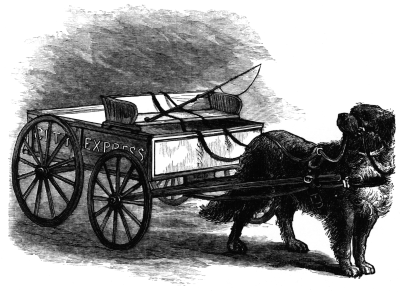
But when uncle Frank tells Bertie that the dog, and the wagon, and the pretty harness, and the whip, are all his own to keep, he is so glad that he jumps up and down like a young monkey.
He says, "Thank you, thank you, uncle Frank! When I am a man, I shall try and be just like you." Then his uncle lifts him into the express-wagon, gives him the reins and the whip, and away they go, down the area-walk, to the stable.
THE GOOD SHIP
"ROSA LEE." "Gayly, gayly, over the sea, Over the sea and far away, Sail, my good ship 'Rosa Lee,' Bring ivory, silk, and gold to me In another summer's sunniest day. "Ever and ever so many a mile, Deep in the endless, hazy blue, Is a golden shore and a spicy isle; The orange blooms there all the while; And the monkeys laugh at the kangaroo. "Purple and yellow and emerald-green, The parrots flit in the groves of palm; Like sparks of living fire are seen The humming-birds that hover between [55]The scarlet blooms in a tropic calm. |
"Over the blue, unending sea
Sail away, and into the west, Till the west is east; then come to me, Freighted as full as full can be Of all that misty island's best,— "Dust of gold and apples of gold, A kangaroo, and a monkey or two, A cage of parrots to laugh and scold, And a silken web, that, when unrolled, Would reach to the moon, and back to you." The boy lets slip his cedarn boat; Gaily she scuds before the breeze, With a steady helm, till, far remote, Only a dim, white speck afloat Is the last glimpse of her that ever he sees. No matter! His thoughts sail far and free With his good ship, and he finds new joy In learning of lands beyond the sea; And this is the freight of his "Rosa Lee,"— Better than gold to the eager boy.
GEORGE S. BURLEIGH.
|
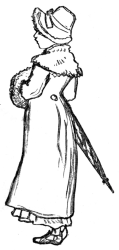
Here is a young girl taking a walk on a cold day. She is strong and well. Her dress is very thick. She has a fur cape, and a muff, and good stout shoes. See how fine she looks. She does not seem to mind the biting frost.
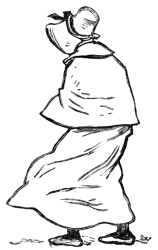
But see this poor old woman tottering along. She wraps her thin cloak around her, but it does not keep out the keen air. She is very cold.
I hope that the rich young girl will give some aid to the poor old woman.
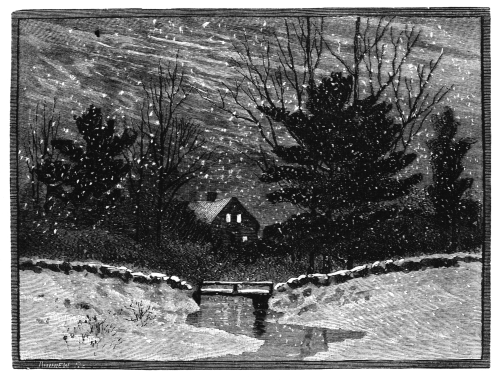
"Did I ever tell you how I lost my red coral beads, and where they were found?" I said this to my boys, Roy and Fred, one frosty night, when we were all gathered around the bright open fire.
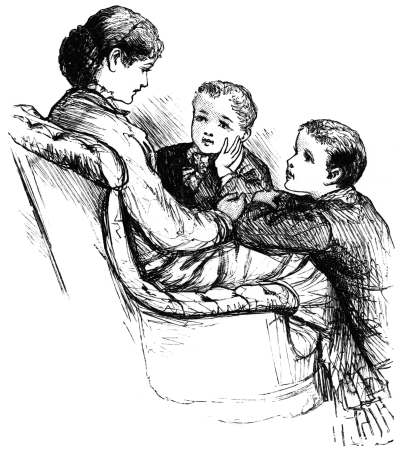
"No!" said Fred decidedly. "That is a new story. Does it tell about the time when you were a little girl? and about the farmhouse and the sitting-room with the big fireplace, and the bellows, and the queer hour-glass, and the old-fashioned iron snuffers in a red tray?"
"Yes," I answered, "it is about every thing you like to hear so well." Then I told the story as follows:—
"My story begins in the long, low, pleasant farmhouse sitting-room, with its big beam running across the low ceiling. There was also a great fireplace, and a wide stone hearth. There we children cracked our nuts, and there, on winter evenings, a great basket of Rhode-Island Greenings always stood warming in the corner. Of course there was a wide mantel over the fireplace. On it stood two tall silver candlesticks, between them were the hour-glass and the snuffer-tray, and at each end of the shelf was a stiff vase, filled with peacock feathers."
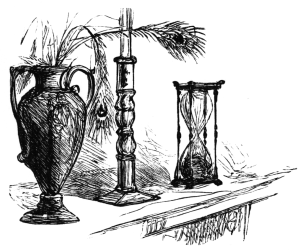
"Don't forget the windows," interrupted Roy.
"Never fear," I said.
"The windows were the loveliest I ever saw,—wide, and deep, and low, and cushioned with red morseen."
"And your grandmother always sat at the south window, knitting, and reading out of the Bible or the Pilgrim's Progress," said Fred.
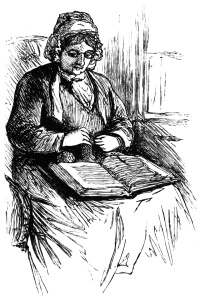
"And she had a bag of red-and-white sugar-plums, to give you when you were good," continued Roy.
"That is all true," I observed. "What comes next?"
"Why, the chrysanthemum-window, of course," said both boys in a chorus.
"There were yellow, red, and white ones," continued Roy.
"Yes," said I, "and I will tell you of the many other pleasant things in the room that I so dearly love to remember."
"There was a chintz lounge, a striped home-made carpet, a big arm-chair for father, and a high-backed rocking-chair for my mother.
"But the most attractive place in the whole room was the corner cupboard. It had a carved green door, and was painted inside a bright vermilion-red. On one shelf stood a silver tankard filled with solid silver spoons, and behind it, in stately shining rows, my grandmother's pewter platters.
"On the next higher shelf stood a set of pink china, a little stout green pitcher, a dozen wine-glasses, and a great blue punch-bowl, gorgeous with yellow butterflies hovering over great double pink roses.
"There were tumblers of jelly on the top shelf, and jars of preserves,[60] and covered glass dishes of honey, and a box made of colored porcupine-quills, in which mother kept her currants, raisins, citron, and candied lemon-peel.
"Now comes the story-part. One day my brothers were all out in the woods setting traps. Mother had just run into Mrs. Newman's for a little call, grandma was spending the day in town, and Alice, my sister, was out working among the flowers.
"Suddenly I thought, 'How good those raisins in the porcupine box would taste!' I did not pause long to consider, but climbed the red shelves of the closet, took down the blue-and-yellow box, and helped myself. I set it back again hastily, for I heard Alice coming in at the back-door. That very night I missed my red coral beads.
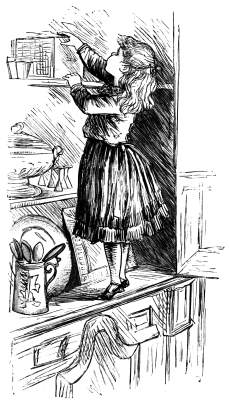
"'They are gone for good,' said my grandma, 'for I saw the child playing on the sand-bank before I went away.'—'And she has been on the hay-mow,' chimed in my brothers.—'And all over the pine-grove with me,' said Alice.—'And down to the grist and saw mill with me,' observed father.
"I mourned greatly over my loss; for my beads were precious, and I prized them more highly than any thing else I possessed. A few nights after my loss, mother, who had gone up to bed with us as usual, said very gravely, 'Susan, I have found your beads; and where do you think they were?'
"I could not tell, of course. 'They were in the porcupine-box,' continued mother; 'and now how came they there?' I told her all about it. My little sin had found me out.
"'Your necklace was a silent witness,' said my mother. I wanted to ask what a 'silent witness' was, but was too much ashamed. The[61] next day I was sent to the store for more raisins and citron. Alice went with me.
"As we left the store, I heard Mr. Dallas, the merchant, say to his clerk, 'Mrs. Chapin is a good customer. She bought two pounds of raisins and a pound of citron only last week, and to-day as much more. I guess they are expecting company. Shouldn't at all wonder if John's folks were coming.'
"My uncle John did come, and brought his pretty new wife, aunt Dorothy. Mother made lovely frosted pound-cake with plums in it, and mince-pies filled with fruit; but what I remember best of all is that she made for me a little plain cake, and left out all the raisins and currants."
"I think it was real mean for your mother to do so," said Fred, excited, and almost tearful.
"I think it was just right," I added. "It taught me a lesson I never forgot."
Since telling this story to my boys, I have observed that the lump-sugar that I keep in the blue china punch-bowl lasts much longer than it has for months before.
And this is the moral of my story, I suppose.
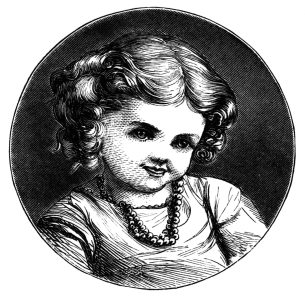
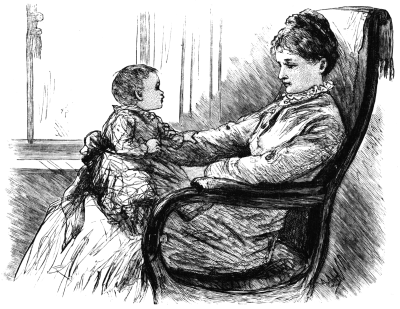
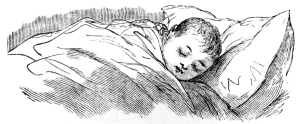

Obvious punctuation errors repaired.
The original text for the January issue had a table of contents that spanned six issues. This was divided amongst those issues.
Additionally, only the January issue had a title page. This page was copied for the remaining five issues. Each issue had the number added on the title page after the Volume number.
Page 35, repeated word "to" removed. Original read (mamma planned to to have some)
Page 62, the format of the first word of the poem was changed from regular text to match the format of the first words of the rest of the text.
End of Project Gutenberg's The Nursery, February 1881, Vol. XXIX, by Various
*** END OF THIS PROJECT GUTENBERG EBOOK THE NURSERY, FEBRUARY 1881 ***
***** This file should be named 40753-h.htm or 40753-h.zip *****
This and all associated files of various formats will be found in:
http://www.gutenberg.org/4/0/7/5/40753/
Produced by Emmy, Juliet Sutherland and the Online
Distributed Proofreading Team at http://www.pgdp.net Music
transcribed by June Troyer.
Updated editions will replace the previous one--the old editions
will be renamed.
Creating the works from public domain print editions means that no
one owns a United States copyright in these works, so the Foundation
(and you!) can copy and distribute it in the United States without
permission and without paying copyright royalties. Special rules,
set forth in the General Terms of Use part of this license, apply to
copying and distributing Project Gutenberg-tm electronic works to
protect the PROJECT GUTENBERG-tm concept and trademark. Project
Gutenberg is a registered trademark, and may not be used if you
charge for the eBooks, unless you receive specific permission. If you
do not charge anything for copies of this eBook, complying with the
rules is very easy. You may use this eBook for nearly any purpose
such as creation of derivative works, reports, performances and
research. They may be modified and printed and given away--you may do
practically ANYTHING with public domain eBooks. Redistribution is
subject to the trademark license, especially commercial
redistribution.
*** START: FULL LICENSE ***
THE FULL PROJECT GUTENBERG LICENSE
PLEASE READ THIS BEFORE YOU DISTRIBUTE OR USE THIS WORK
To protect the Project Gutenberg-tm mission of promoting the free
distribution of electronic works, by using or distributing this work
(or any other work associated in any way with the phrase "Project
Gutenberg"), you agree to comply with all the terms of the Full Project
Gutenberg-tm License available with this file or online at
www.gutenberg.org/license.
Section 1. General Terms of Use and Redistributing Project Gutenberg-tm
electronic works
1.A. By reading or using any part of this Project Gutenberg-tm
electronic work, you indicate that you have read, understand, agree to
and accept all the terms of this license and intellectual property
(trademark/copyright) agreement. If you do not agree to abide by all
the terms of this agreement, you must cease using and return or destroy
all copies of Project Gutenberg-tm electronic works in your possession.
If you paid a fee for obtaining a copy of or access to a Project
Gutenberg-tm electronic work and you do not agree to be bound by the
terms of this agreement, you may obtain a refund from the person or
entity to whom you paid the fee as set forth in paragraph 1.E.8.
1.B. "Project Gutenberg" is a registered trademark. It may only be
used on or associated in any way with an electronic work by people who
agree to be bound by the terms of this agreement. There are a few
things that you can do with most Project Gutenberg-tm electronic works
even without complying with the full terms of this agreement. See
paragraph 1.C below. There are a lot of things you can do with Project
Gutenberg-tm electronic works if you follow the terms of this agreement
and help preserve free future access to Project Gutenberg-tm electronic
works. See paragraph 1.E below.
1.C. The Project Gutenberg Literary Archive Foundation ("the Foundation"
or PGLAF), owns a compilation copyright in the collection of Project
Gutenberg-tm electronic works. Nearly all the individual works in the
collection are in the public domain in the United States. If an
individual work is in the public domain in the United States and you are
located in the United States, we do not claim a right to prevent you from
copying, distributing, performing, displaying or creating derivative
works based on the work as long as all references to Project Gutenberg
are removed. Of course, we hope that you will support the Project
Gutenberg-tm mission of promoting free access to electronic works by
freely sharing Project Gutenberg-tm works in compliance with the terms of
this agreement for keeping the Project Gutenberg-tm name associated with
the work. You can easily comply with the terms of this agreement by
keeping this work in the same format with its attached full Project
Gutenberg-tm License when you share it without charge with others.
1.D. The copyright laws of the place where you are located also govern
what you can do with this work. Copyright laws in most countries are in
a constant state of change. If you are outside the United States, check
the laws of your country in addition to the terms of this agreement
before downloading, copying, displaying, performing, distributing or
creating derivative works based on this work or any other Project
Gutenberg-tm work. The Foundation makes no representations concerning
the copyright status of any work in any country outside the United
States.
1.E. Unless you have removed all references to Project Gutenberg:
1.E.1. The following sentence, with active links to, or other immediate
access to, the full Project Gutenberg-tm License must appear prominently
whenever any copy of a Project Gutenberg-tm work (any work on which the
phrase "Project Gutenberg" appears, or with which the phrase "Project
Gutenberg" is associated) is accessed, displayed, performed, viewed,
copied or distributed:
This eBook is for the use of anyone anywhere at no cost and with
almost no restrictions whatsoever. You may copy it, give it away or
re-use it under the terms of the Project Gutenberg License included
with this eBook or online at www.gutenberg.org
1.E.2. If an individual Project Gutenberg-tm electronic work is derived
from the public domain (does not contain a notice indicating that it is
posted with permission of the copyright holder), the work can be copied
and distributed to anyone in the United States without paying any fees
or charges. If you are redistributing or providing access to a work
with the phrase "Project Gutenberg" associated with or appearing on the
work, you must comply either with the requirements of paragraphs 1.E.1
through 1.E.7 or obtain permission for the use of the work and the
Project Gutenberg-tm trademark as set forth in paragraphs 1.E.8 or
1.E.9.
1.E.3. If an individual Project Gutenberg-tm electronic work is posted
with the permission of the copyright holder, your use and distribution
must comply with both paragraphs 1.E.1 through 1.E.7 and any additional
terms imposed by the copyright holder. Additional terms will be linked
to the Project Gutenberg-tm License for all works posted with the
permission of the copyright holder found at the beginning of this work.
1.E.4. Do not unlink or detach or remove the full Project Gutenberg-tm
License terms from this work, or any files containing a part of this
work or any other work associated with Project Gutenberg-tm.
1.E.5. Do not copy, display, perform, distribute or redistribute this
electronic work, or any part of this electronic work, without
prominently displaying the sentence set forth in paragraph 1.E.1 with
active links or immediate access to the full terms of the Project
Gutenberg-tm License.
1.E.6. You may convert to and distribute this work in any binary,
compressed, marked up, nonproprietary or proprietary form, including any
word processing or hypertext form. However, if you provide access to or
distribute copies of a Project Gutenberg-tm work in a format other than
"Plain Vanilla ASCII" or other format used in the official version
posted on the official Project Gutenberg-tm web site (www.gutenberg.org),
you must, at no additional cost, fee or expense to the user, provide a
copy, a means of exporting a copy, or a means of obtaining a copy upon
request, of the work in its original "Plain Vanilla ASCII" or other
form. Any alternate format must include the full Project Gutenberg-tm
License as specified in paragraph 1.E.1.
1.E.7. Do not charge a fee for access to, viewing, displaying,
performing, copying or distributing any Project Gutenberg-tm works
unless you comply with paragraph 1.E.8 or 1.E.9.
1.E.8. You may charge a reasonable fee for copies of or providing
access to or distributing Project Gutenberg-tm electronic works provided
that
- You pay a royalty fee of 20% of the gross profits you derive from
the use of Project Gutenberg-tm works calculated using the method
you already use to calculate your applicable taxes. The fee is
owed to the owner of the Project Gutenberg-tm trademark, but he
has agreed to donate royalties under this paragraph to the
Project Gutenberg Literary Archive Foundation. Royalty payments
must be paid within 60 days following each date on which you
prepare (or are legally required to prepare) your periodic tax
returns. Royalty payments should be clearly marked as such and
sent to the Project Gutenberg Literary Archive Foundation at the
address specified in Section 4, "Information about donations to
the Project Gutenberg Literary Archive Foundation."
- You provide a full refund of any money paid by a user who notifies
you in writing (or by e-mail) within 30 days of receipt that s/he
does not agree to the terms of the full Project Gutenberg-tm
License. You must require such a user to return or
destroy all copies of the works possessed in a physical medium
and discontinue all use of and all access to other copies of
Project Gutenberg-tm works.
- You provide, in accordance with paragraph 1.F.3, a full refund of any
money paid for a work or a replacement copy, if a defect in the
electronic work is discovered and reported to you within 90 days
of receipt of the work.
- You comply with all other terms of this agreement for free
distribution of Project Gutenberg-tm works.
1.E.9. If you wish to charge a fee or distribute a Project Gutenberg-tm
electronic work or group of works on different terms than are set
forth in this agreement, you must obtain permission in writing from
both the Project Gutenberg Literary Archive Foundation and Michael
Hart, the owner of the Project Gutenberg-tm trademark. Contact the
Foundation as set forth in Section 3 below.
1.F.
1.F.1. Project Gutenberg volunteers and employees expend considerable
effort to identify, do copyright research on, transcribe and proofread
public domain works in creating the Project Gutenberg-tm
collection. Despite these efforts, Project Gutenberg-tm electronic
works, and the medium on which they may be stored, may contain
"Defects," such as, but not limited to, incomplete, inaccurate or
corrupt data, transcription errors, a copyright or other intellectual
property infringement, a defective or damaged disk or other medium, a
computer virus, or computer codes that damage or cannot be read by
your equipment.
1.F.2. LIMITED WARRANTY, DISCLAIMER OF DAMAGES - Except for the "Right
of Replacement or Refund" described in paragraph 1.F.3, the Project
Gutenberg Literary Archive Foundation, the owner of the Project
Gutenberg-tm trademark, and any other party distributing a Project
Gutenberg-tm electronic work under this agreement, disclaim all
liability to you for damages, costs and expenses, including legal
fees. YOU AGREE THAT YOU HAVE NO REMEDIES FOR NEGLIGENCE, STRICT
LIABILITY, BREACH OF WARRANTY OR BREACH OF CONTRACT EXCEPT THOSE
PROVIDED IN PARAGRAPH 1.F.3. YOU AGREE THAT THE FOUNDATION, THE
TRADEMARK OWNER, AND ANY DISTRIBUTOR UNDER THIS AGREEMENT WILL NOT BE
LIABLE TO YOU FOR ACTUAL, DIRECT, INDIRECT, CONSEQUENTIAL, PUNITIVE OR
INCIDENTAL DAMAGES EVEN IF YOU GIVE NOTICE OF THE POSSIBILITY OF SUCH
DAMAGE.
1.F.3. LIMITED RIGHT OF REPLACEMENT OR REFUND - If you discover a
defect in this electronic work within 90 days of receiving it, you can
receive a refund of the money (if any) you paid for it by sending a
written explanation to the person you received the work from. If you
received the work on a physical medium, you must return the medium with
your written explanation. The person or entity that provided you with
the defective work may elect to provide a replacement copy in lieu of a
refund. If you received the work electronically, the person or entity
providing it to you may choose to give you a second opportunity to
receive the work electronically in lieu of a refund. If the second copy
is also defective, you may demand a refund in writing without further
opportunities to fix the problem.
1.F.4. Except for the limited right of replacement or refund set forth
in paragraph 1.F.3, this work is provided to you 'AS-IS', WITH NO OTHER
WARRANTIES OF ANY KIND, EXPRESS OR IMPLIED, INCLUDING BUT NOT LIMITED TO
WARRANTIES OF MERCHANTABILITY OR FITNESS FOR ANY PURPOSE.
1.F.5. Some states do not allow disclaimers of certain implied
warranties or the exclusion or limitation of certain types of damages.
If any disclaimer or limitation set forth in this agreement violates the
law of the state applicable to this agreement, the agreement shall be
interpreted to make the maximum disclaimer or limitation permitted by
the applicable state law. The invalidity or unenforceability of any
provision of this agreement shall not void the remaining provisions.
1.F.6. INDEMNITY - You agree to indemnify and hold the Foundation, the
trademark owner, any agent or employee of the Foundation, anyone
providing copies of Project Gutenberg-tm electronic works in accordance
with this agreement, and any volunteers associated with the production,
promotion and distribution of Project Gutenberg-tm electronic works,
harmless from all liability, costs and expenses, including legal fees,
that arise directly or indirectly from any of the following which you do
or cause to occur: (a) distribution of this or any Project Gutenberg-tm
work, (b) alteration, modification, or additions or deletions to any
Project Gutenberg-tm work, and (c) any Defect you cause.
Section 2. Information about the Mission of Project Gutenberg-tm
Project Gutenberg-tm is synonymous with the free distribution of
electronic works in formats readable by the widest variety of computers
including obsolete, old, middle-aged and new computers. It exists
because of the efforts of hundreds of volunteers and donations from
people in all walks of life.
Volunteers and financial support to provide volunteers with the
assistance they need are critical to reaching Project Gutenberg-tm's
goals and ensuring that the Project Gutenberg-tm collection will
remain freely available for generations to come. In 2001, the Project
Gutenberg Literary Archive Foundation was created to provide a secure
and permanent future for Project Gutenberg-tm and future generations.
To learn more about the Project Gutenberg Literary Archive Foundation
and how your efforts and donations can help, see Sections 3 and 4
and the Foundation information page at www.gutenberg.org
Section 3. Information about the Project Gutenberg Literary Archive
Foundation
The Project Gutenberg Literary Archive Foundation is a non profit
501(c)(3) educational corporation organized under the laws of the
state of Mississippi and granted tax exempt status by the Internal
Revenue Service. The Foundation's EIN or federal tax identification
number is 64-6221541. Contributions to the Project Gutenberg
Literary Archive Foundation are tax deductible to the full extent
permitted by U.S. federal laws and your state's laws.
The Foundation's principal office is located at 4557 Melan Dr. S.
Fairbanks, AK, 99712., but its volunteers and employees are scattered
throughout numerous locations. Its business office is located at 809
North 1500 West, Salt Lake City, UT 84116, (801) 596-1887. Email
contact links and up to date contact information can be found at the
Foundation's web site and official page at www.gutenberg.org/contact
For additional contact information:
Dr. Gregory B. Newby
Chief Executive and Director
gbnewby@pglaf.org
Section 4. Information about Donations to the Project Gutenberg
Literary Archive Foundation
Project Gutenberg-tm depends upon and cannot survive without wide
spread public support and donations to carry out its mission of
increasing the number of public domain and licensed works that can be
freely distributed in machine readable form accessible by the widest
array of equipment including outdated equipment. Many small donations
($1 to $5,000) are particularly important to maintaining tax exempt
status with the IRS.
The Foundation is committed to complying with the laws regulating
charities and charitable donations in all 50 states of the United
States. Compliance requirements are not uniform and it takes a
considerable effort, much paperwork and many fees to meet and keep up
with these requirements. We do not solicit donations in locations
where we have not received written confirmation of compliance. To
SEND DONATIONS or determine the status of compliance for any
particular state visit www.gutenberg.org/donate
While we cannot and do not solicit contributions from states where we
have not met the solicitation requirements, we know of no prohibition
against accepting unsolicited donations from donors in such states who
approach us with offers to donate.
International donations are gratefully accepted, but we cannot make
any statements concerning tax treatment of donations received from
outside the United States. U.S. laws alone swamp our small staff.
Please check the Project Gutenberg Web pages for current donation
methods and addresses. Donations are accepted in a number of other
ways including checks, online payments and credit card donations.
To donate, please visit: www.gutenberg.org/donate
Section 5. General Information About Project Gutenberg-tm electronic
works.
Professor Michael S. Hart was the originator of the Project Gutenberg-tm
concept of a library of electronic works that could be freely shared
with anyone. For forty years, he produced and distributed Project
Gutenberg-tm eBooks with only a loose network of volunteer support.
Project Gutenberg-tm eBooks are often created from several printed
editions, all of which are confirmed as Public Domain in the U.S.
unless a copyright notice is included. Thus, we do not necessarily
keep eBooks in compliance with any particular paper edition.
Most people start at our Web site which has the main PG search facility:
www.gutenberg.org
This Web site includes information about Project Gutenberg-tm,
including how to make donations to the Project Gutenberg Literary
Archive Foundation, how to help produce our new eBooks, and how to
subscribe to our email newsletter to hear about new eBooks.